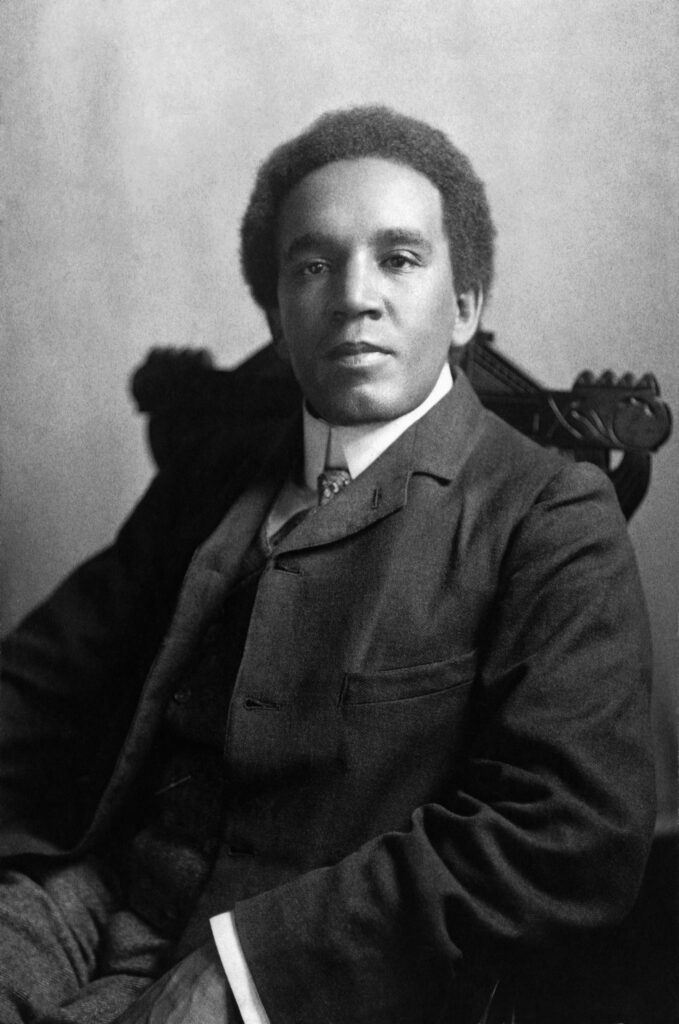
Samuel Coleridge-Taylor, credit Wikipedia
ENDNOTES, January 2022
In this edition; Stuart Millson on composer Samuel Coleridge-Taylor
When one thinks of English music, one thinks immediately of Edward Elgar, or Ralph Vaughan Williams: figures who represent a very rooted, ancestrally-determined Englishness. Few people realise, however, that during the turn-of-the-century period, a composer was at work in Britain whose single-minded pursuit of excellence and the romantic spirit in our musical tradition placed him at the pinnacle of the profession. Most famous for his great choral-orchestral work, Hiawatha’s Wedding Feast, this artist also produced dozens of other beautifully-written works, including chamber quintets and sonatas, an orchestral Ballade, and a Violin Concerto – recorded by both the Chandos and Lyrita labels.
The composer was Samuel Coleridge-Taylor (not to be confused with Samuel Taylor Coleridge, the poet) and, at first glance, he could be considered a musical outsider. Samuel was born in London in the August of 1875, the son of a doctor from Sierra Leone and an Englishwoman. His talent was marked out from a very early age: in 1890, at the age of just 15, he entered the prestigious Royal College of Music, that powerhouse which sought to establish an English, or British national school of music. The violin was his instrument, and by 1892 the gifted young student joined the composition classes of the great and somewhat forbidding Sir Charles Villiers Stanford, an Irishman and a disciple of Brahms.
A new commission
During those years, Samuel wrote much chamber music, including a piano quintet; and we should not forget that Elgar’s monumental quintet (often seen as one of the greatest English chamber works) was to come some 20 years later. However, Elgar – often seen as the unofficial composer-laureate of Britain – was taken with Samuel’s music, and before long he was offered a commission for a new work for the Gloucester Festival, the orchestral Ballade in A Minor.
This opportunity came about as a direct result of Elgar’s encouragement, and it is interesting to note that Elgar was still one year away from the premiere of the piece that made his name: the Enigma Variations of 1899. Perhaps Elgar, a Roman Catholic and an outsider in social terms, sympathised with this young, mixed race composer.
Samuel Coleridge-Taylor’s next step forward was the first performance of Hiawatha’s Wedding Feast, conducted by Stanford, no less. Two further sections of the Hiawatha legend followed: The Death of Minnehaha, and Hiawatha’s Departure (written in 1900); and other requests ensued, for scores for Shakespeare and Alfred Noyes plays, such was Samuel’s facility and gift for tuneful accessibility.
Conducting the New York Philharmonic
Yet his talents were not just confined to composing: this unassuming man was invited to conduct the New York Philharmonic, at that time under the baton of Gustav Mahler. So successful was Coleridge-Taylor that he became known as “the black Mahler”; and in 1904 he was granted the exceptional honour of being invited to the White House by the President of the United States, Theodore Roosevelt.
A professor of music at Trinity College of Music, London, and later at the Guildhall School of Music, it seemed that this remarkable composer would become one of this country’s most famous musical figures. And yet it was not to be. At the age of just 37, Samuel Coleridge-Taylor collapsed at West Croydon railway station and died a few days later of pneumonia. One would like to think that the composer’s family were well-provided for, considering the success of the Hiawatha music. But Samuel had sold the work outright, and so not one penny in royalties ever came to the family.
A pre-echo of Eric Coates
Today, we have almost forgotten this skilled weaver of soaring and mellow tunes, although it was pleasing to see the Overture to The Song of Hiawatha appear recently on a new disc of British overtures, from the Chandos record label. And his lyrical Petite Suite de Concert was performed at the English Music Festival by the BBC Concert Orchestra, conducted by Martin Yates – the piece almost a pre-echo of the well-crafted, light-music style of Eric Coates.
Coleridge-Taylor, championed by Elgar, was a part of the English Musical Renaissance, and he is doubtless despised by cultural commentators on the liberal-left for not undertaking a “critique” of Anglo-Saxon hegemony and imperialism. Instead, this unusual composer gives us a clear example of something quite different: the success of Victorian and Edwardian England in absorbing and promoting an outsider.
Coleridge-Taylor, Violin Concerto in G minor, Op. 80. LPO/Nicholas Braithwaite, Lorrain McAslan, violin.
Overture to The Song of Hiawatha (with other British concert overtures), BBC National Orchestra of Wales, Rumon Gamba, Chandos label, 10797.
Stuart Millson is the Classical Music Editor of The Quarterly Review











Possibly Mr. Colegridge-Taylor was a talented composer. But would you have sung his praises here if he had been a white man?